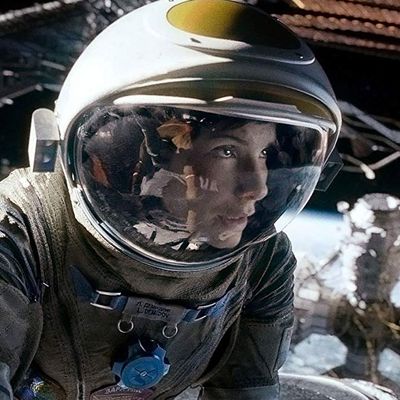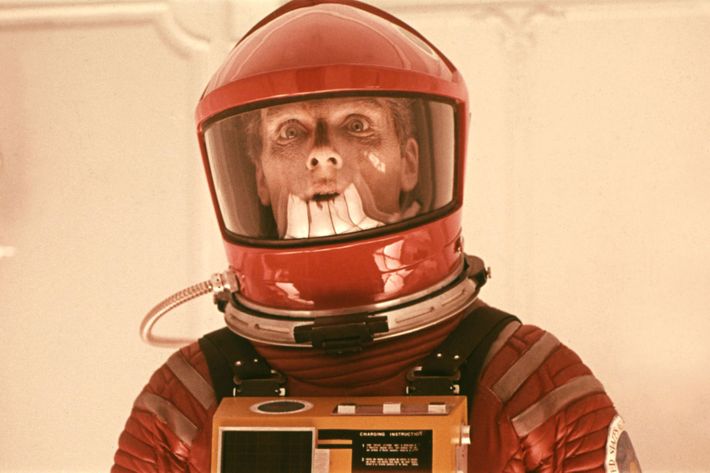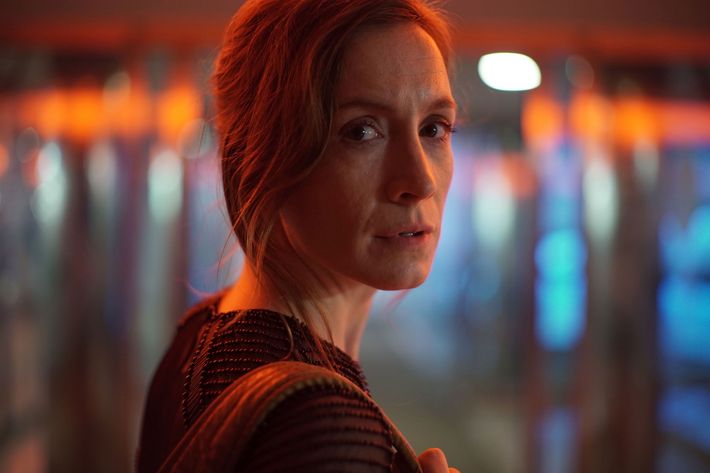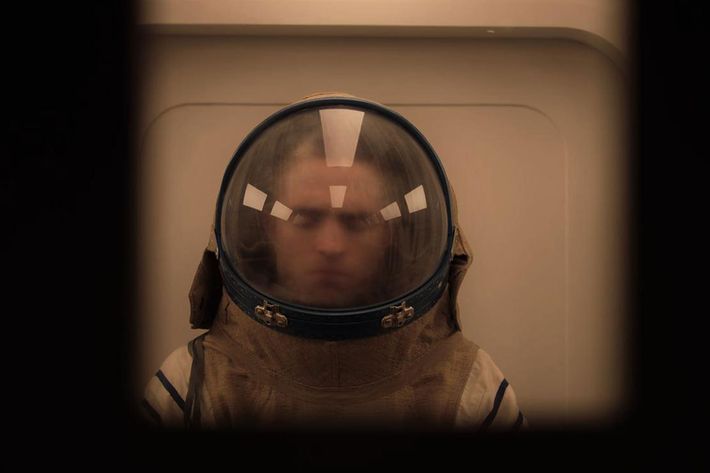
Whenever I’m sad, I generally pursue one of two routes. One involves a My Best Friend’s Wedding–Moonstruck–Bridget Jones’s Diary triple feature, my bathtub, a large bowl of pasta, and a large bowl of wine. The other involves watching a movie in which a human being travels to space alone or with strangers and has some sort of debilitating existential breakdown. Both sorts of films usually have the same effect on me: I am instantly soothed and placated, like a baby floating idly through space (alone).
But lately, I’ve found the “depressed in space alone” movies to be more calming than the delightful rom-coms. Maybe it’s because the rom-coms have lost even the most basic sense of achievability. I can no longer envision a universe in which Julia Roberts is allowed past Wrigley Field’s intensive security sans ticket to roam through the bathrooms screaming. The idea that Bridget Jones could secure a full-time job in television journalism on a lark is so far from reality that I cannot get lost in it as I once did. These extremely ’90s fantasies feel too fantastic. In 2019, as our gun-drunk late-capitalist dystopia builds to a cacophonous crescendo, their foundational premises are absolutely insane.
However! Movies about people who are morose as fuck, floating through the ether, grasping for meaning and finding only the chilly abyss for company? Nothing is more relatable — or more peaceful. To be clear: It’s not that I want to go to space by myself and single-handedly confront the black hole of hopelessness at the center of the human experience. In fact, it’s quite the opposite. Space is terrifying, the most expansive place I can imagine having a claustrophobic panic attack, and I simply do not have the constitution for it. But I do like watching fictional people slowly lose it while they’re trapped alone in space; then I go to bed, feeling like I’ve accomplished some important scientific, psychological work. I drift off to sleep, congratulating myself for my bravery: The only thing worse than the Earth’s reality in 2019 is the literal void, and I confronted it! (Even if it was just through the eyes of Sandra Bullock, Sam Rockwell or Laurence Fishburne.) I opened the pod-bay doors, then closed them when I felt like it.

Maybe this is an obvious thing to say, but “depressed in space alone” movies are really just movies about being depressed, period. They’re about humans struggling to make peace with our mortality, with how we ultimately must face death alone and how we’re all just the universe’s bitch, unable to fully control the arc of our journey, no matter how hard we try. So I suppose there’s a bit of rude Schadenfreude involved in loving these movies as well: I’m trapped and depressed on our rapidly deteriorating crypto-fascict planet, but you, Matthew McConaughey, are trapped and depressed … in space! I can turn to my friends and complain about the meaninglessness of life, but George Clooney, all you have is a hallucination of your dead wife. Sucks, dude!
There are, of course, exceptions to the rule that all “depressed in space alone” movies are good: Passengers was an atrocity, and Matt Damon cared about crops a little too much for my taste in The Martian. But earlier this month, another fantastic “depressed in space alone” movie entered the pantheon: a Swedish indie sci-fi film (four sweeter words never existed) called Aniara snuck into theaters and onto VOD. Popular opinion is that it’s a rather harrowing film, as is the Swedes’ way (RIP Ingmar Bergman, who would have absolutely made this movie if he were still alive). Reviewers have been calling it “relentless, brutal fatalism,” a “one-way ticket into the abyss,” and “soul-crushing.” I watched it on Tuesday with a glass of rosé in hand and followed it with one of the best nights of sleep in my life. I don’t mean this as a weird flex, like some Tarantino bro who won’t stop telling you how he doesn’t think Pulp Fiction is “that violent,” but rather as a statement of fact that should probably scare both you and my therapist.

Aniara, based on Harry Martinson’s 1956 poem cycle, follows a ship of the same name that departs an Earth ravaged by climate change; it’s full of passengers who are burned by the sun and desperate for a new life on Mars. Our relentlessly plucky protagonist, Mimaroben (Emelie Jonsson), is onboard the Aniara as a staff member, running a sort of hologram program called Mima that soothes passengers by showing them lifelike images of the planet they once knew. A few minutes into the film, a piece of space debris knocks the ship off course. The captain assures the passengers they’ll find a “celestial body” to bounce off of in a few years’ time — but a few years soon turns into much, much longer. Food becomes scarce. People start killing themselves in record numbers. Cults form, followed (naturally) by orgies.
Mimaroben, ever optimistic, manages to fall in love among the muted chaos and even start a family, but her lover, Isagel (Bianca Cruzeiro), can’t stop questioning the point of it all. Mimaroben’s roommate, billed simply as the Astronomer, can’t stop trying to find a solution to the ship’s drifting and says what everything is thinking, regularly and out loud: “It’s all so peripheral what we’re doing. It’s so futile, so meaningless.”
Aniara is one of the darker entries in the “depressed in space alone” genre. It pulls no punches when it comes to profound ennui, and it’s not afraid to get bleaker and bleaker as it moves forward. And quite appropriately, it isn’t the only 2019 sci-fi film in which “the void” is its own character. Earlier this year, Claire Denis’s desolate space movie High Life hit theaters for a brief time, starring Robert Pattinson as another man depressed in space, raising his daughter alone in a ship once designed to hold his fellow convicted criminals. At first violent and chaotic, the movie becomes so stark, so sad, and so lonely that the person I saw it with had to leave the theater. Denis lingers on Pattinson’s face as he reaches the inevitable conclusion that he and his daughter have no future to look forward to, no possibilities ahead of them.

Pattinson’s conclusion is a common one in Trump’s America, and it’s easy to draw parallels between these movies and our reality, especially because Aniara directly connects the world we live in now with the nonexistent world of the near future. But I left both Aniara and High Life invigorated, reminded of the total futility of being a person — but also of how little that futility actually matters. Once you’ve accepted that what we’re doing, on a micro and a macro scale, is “so peripheral, so futile, and so meaningless,” it frees you, in a way. And then you can keep doing it (orgies) anyway.


